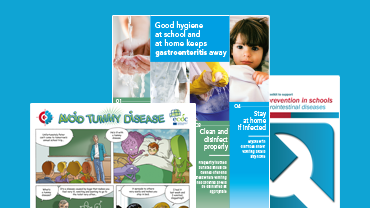Yersiniosis
Yersiniosis is an enteric infection caused by Yersinia enterocolitica and Yersinia pseudotuberculosis. Majority of the cases are caused by Y. enterocolitica, whereas Y. pseudotuberculosis is relatively uncommon cause of yersiniosis. Yersinia pestis is a cause of plague.
After an incubation period of 4-10 days, symptoms of yersiniosis include fever and abdominal pain in the right lower part of the abdomen and may be confused with appendicitis. Children can have (bloody) diarrhoea. Outbreaks are sometimes detected as a sudden increase in appendectomies in children due to mistaken diagnoses of appendicitis. Symptoms may last from one to three weeks or longer. Post infectious complications are rare and can include reactive arthritis, skin inflammation (erythema nodosum) and sepsis.
Pigs are the most important reservoir of Y. enterocolitica. Yersiniosis in human is regularly related to the consumption of raw or undercooked pork or cross-contamination of other food items during the handling and preparation of raw pork. Both domestic and wild animals are natural reservoirs of Y. pseudotuberculosis. Yersinia infections due to Y. pseudotuberculosis are rare, and mostly caused by eating contaminated vegetables. Occasionally yersiniosis occurs after direct contact with infected animals (e.g. farm animals and pets).
Yersinia bacteria survive and grow at low temperatures. Refrigeration temperatures are generally insufficient to prevent the growth, but thorough cooking of the food kill the bacteria. Pork should be properly cooked before consumption. Proper washing and peeling of vegetables in home kitchens can decrease the contamination and risk for infections.





